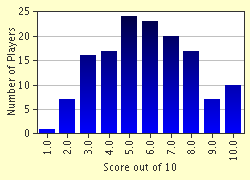Quiz Answer Key and Fun Facts
1. What is the official name nowadays of the town in which Immanuel Kant lived throughout the greater part of his life?
2. Which German professor sympathized about 1933 with the Nazis (no, my question is not finished yet, because 4 options only really wouldn't do), wrote a book called "Sein und Zeit" ("Being and Time"), and liked to wander in the Black Forest, with or without the company of his mistress Hannah Arendt?
3. Which philosopher has said: "If you are going to visit women, don´t forget the whip!" ("Wenn du zu den Weibern gehst, so vergiss die Peitsche nicht!")?
4. He was for some time a mercenary in a foreign army, but at any rate one of the best mathematicians of his time, and became a friend of the Swedish Queen. Perhaps his philosophy can be best summarized in two words: self-conscious thinking.
5. The first half of the 20th century saw the emergence of a school of thought commonly known as the "School of Vienna". Which of the following terms would be most appropriate to describe the main tenets of this school?
6. Johann Wolfgang Goethe is not commonly known as a philosopher, but perhaps wrongly so. At any rate he disagreed with another non-philosopher on the subject of colours, which indeed had some philosophical implications. Who was that other man?
7. This man - later knighted by the sovereign of the United Kingdom - disagreed on the subject of the parameters of scientific theories with the logical positivists, and introduced the concept of "falsifiability", which gave him a place of his own.
8. Even in the so-called "liberal-minded" Athens of Antiquity a philosopher ran into troubles - even with considerable danger for his life - because he regarded the sun as a "fiery stone" (not a bad idea, in view of that time). Who was this audacious thinker?
9. "The Myth of the 20th century" is a book whose contents are not easily consumated, for various reasons. But quite a lot of people regarded the author in his time as a great philosopher. Now, however, there hardly is anyone left who still holds this opinion. Who was that man?
10. Karl Popper vehemently attacked a Greek philosopher, whom he regarded as an enemy of an 'open society', due to the opinions this philosopher held about the State. Who was that thinker?
Source: Author
Oblomov
This quiz was reviewed by FunTrivia editor
thejazzkickazz before going online.
Any errors found in FunTrivia content are routinely corrected through our feedback system.

